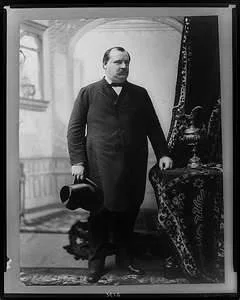Elections: Grover Cleveland
Quote of the Day:
Officeholders are theagents of the people, no their masters. - Grover Cleveland
Public officers are the servants and agents of the people, to execute the laws whichthe people have made. - Grover Cleveland
Day 11 VoCaBulary:
lose
wise
victory
wrong
mudslinging
minority
margin
landslide
Grover Cleveland:
Grover Cleveland was both the 22nd and the 24th President of the United States. Cleveland was born on March 18, 1837, in Caldwell, New Jersey. In 1886, during Cleveland's first term as president, France gave the United States the Statue of Liberty. In 1888, Cleveland lost his bid for re-election to Benjamin Harrison but Cleveland won the presidency back in 1892. Cleveland served as President from 1885 to 1889, and from 1893 to 1897. He died on June 24, 1908, in Princeton, New Jersey.
Discovering Elections:
Whom did President Cleveland have to campaign against when he ran for president of the US? Grover Cleveland campaigned against James G. Blaine in 1884 and won. He campaigned against Benjamin Harrison and James B. Weaver in 1892 and won as well.
What are the two main political parties in Amercia today? Who are their candidates for the next presidential election? Democrats & Republicians ; Romney & Obama
What are the major responsibilities of state government?
Each state has its own constitution based on its unique history, needs, philosophy, and geography. A state's constitution is similar to that of the national Constitution; however, the laws made in individual states cannot conflict with the national Constitution or national laws. The national Constitution is "the supreme law of the land."
Just like that of the national government, each state's constitution separates power between three branches -- legislative, judicial, and executive. In addition, in most states, the legislative branch contains two houses . (In Nebraska, the state legislature only has one house). Instead of a president, each state elects a governor. State government usually has three different sections or branches, and each branch has its own job to do.
Powers that are reserved or saved for the states. Many of these are not listed but given to the states by the 9th and 10th Amendments.
·Control the state militia (national guard)
·Conduct elections
·Set voter qualifications
·Provide public education
·Certify public school teachers
·Regulate trade within the state (intrastate trade)
What is one of the most important rights of American citizens? Where are the rights of American citizens guaranteed--what is the document called? Which rights does it include?
The most important right citizens have is the right to vote.
On December 15, 1791, ten amendments were added to the Constitution. These amendments guarantee certain freedoms and rights, so they are known as the Bill of Rights. These amendments protect individual rights against government intrusion.
Amendment I
Congress shall make no law respecting an establishment of religion, or prohibiting the free exercise thereof; or abridging the freedom of speech, or of the press; or the right of the people peaceably to assemble, and to petition the Government for a redress of grievances.
Amendment II
A well regulated Militia, being necessary to the security of a free State, the right of the people to keep and bear Arms, shall not be infringed.
Amendment III
No Soldier shall, in time of peace be quartered in any house, without the consent of the Owner, nor in time of war, but in a manner to be prescribed by law.
Amendment IV
The right of the people to be secure in their persons, houses, papers, and effects, against unreasonable searches and seizures, shall not be violated, and no Warrants shall issue, but upon probable cause, supported by Oath or affirmation, and particularly describing the place to be searched, and the persons or things to be seized.
Amendment V
No person shall be held to answer for a capital, or otherwise infamous crime, unless on a presentment or indictment of a Grand Jury, except in cases arising in the land or naval forces, or in the Militia, when in actual service in time of War or public danger; nor shall any person be subject for the same offence to be twice put in jeopardy of life or limb; nor shall be compelled in any criminal case to be a witness against himself, nor be deprived of life, liberty, or property, without due process of law; nor shall private property be taken for public use, without just compensation.
Amendment VI
In all criminal prosecutions, the accused shall enjoy the right to a speedy and public trial, by an impartial jury of the State and district wherein the crime shall have been committed, which district shall have been previously ascertained by law, and to be informed of the nature and cause of the accusation; to be confronted with the witnesses against him; to have compulsory process for obtaining witnesses in his favor, and to have the Assistance of Counsel for his defence.
Amendment VII
In suits at common law, where the value in controversy shall exceed twenty dollars, the right of trial by jury shall be preserved, and no fact tried by a jury, shall be otherwise reexamined in any Court of the United States, than according to the rules of the common law.
Amendment VIII
Excessive bail shall not be required, nor excessive fines imposed, nor cruel and unusual punishments inflicted.
Amendment IX
The enumeration in the Constitution, of certain rights, shall not be construed to deny or disparage others retained by the people.
Amendment X
The powers not delegated to the United States by the Constitution, nor prohibited by it to the States, are reserved to the States respectively, or to the people.
Who are your state elected officials? List your governor and lieutenant governor.




